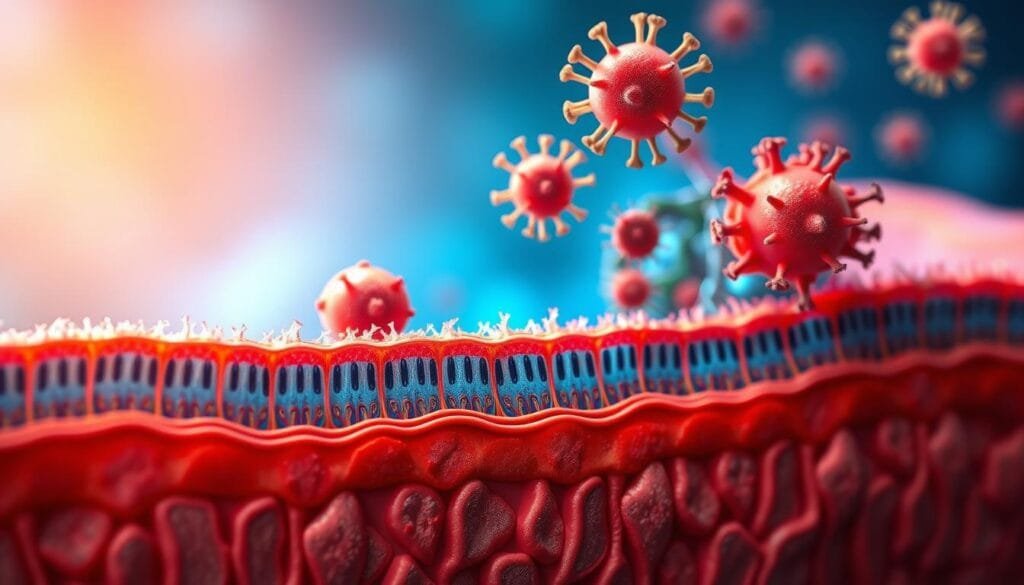Currently Empty: RM0.00
Welcome to Wellness Concept, Malaysia’s leading provider of advanced solutions designed to optimize wellness through gut balance. Recent scientific breakthroughs reveal a powerful connection between our microbiome and overall well-being, particularly in managing conditions like obesity and diabetes.
Modern lifestyles often disrupt natural gut harmony, contributing to rising concerns about metabolic imbalances. Research from the past decade shows how specific microbial strains can help restore this balance, offering a science-backed approach to wellness. At Wellness Concept, we specialize in carefully formulated products that address these challenges head-on.
Why choose us? Our team combines cutting-edge research with practical solutions, making complex science accessible to everyone. Whether you’re managing a specific condition or pursuing preventive care, our evidence-based offerings provide tailored support for lasting results.
Key Takeaways
- Gut microbiome health directly impacts metabolic function
- Modern diets and stress contribute to microbial imbalance
- Targeted microbial solutions can address specific wellness needs
- Scientific validation ensures safe, effective interventions
- Wellness Concept offers personalized approaches for Malaysian residents
Introduction to Metabolic Health Trends
Contemporary science reveals new pathways to achieving body balance through internal ecosystem care. Nearly 40% of Malaysian adults now show signs of systemic imbalance, driving interest in solutions beyond traditional approaches. This shift highlights the importance of maintaining microbial harmony for whole-body wellness.
What Are These Beneficial Microbes?
Scientists define these live organisms as nature’s tiny helpers that support bodily functions when consumed properly. Unlike standard supplements, specific strains like Bifidobacterium and lactic acid bacteria interact directly with biological processes. Their unique ability to thrive in intestinal environments makes them particularly effective.
Our Inner Ecosystem’s Powerful Influence
The gut’s microbial community acts like a control center for energy management and nutrient processing. Research shows these microscopic residents help regulate:
- Blood sugar balance mechanisms
- Fat storage signaling pathways
- Inflammatory response coordination
When this delicate system gets disrupted—often through poor diet or stress—it can trigger chain reactions affecting multiple body functions. Targeted microbial support helps restore equilibrium, offering a natural method for maintaining systemic harmony.
The Science Behind Probiotics and Metabolic Wellness
Modern research reveals how specific live cultures interact with our biological systems to promote equilibrium. These microscopic allies work through multiple pathways, creating ripple effects that extend far beyond digestion.
How Tiny Organisms Make Big Changes
Beneficial microbes reshape gut environments by competing with harmful strains for resources. They produce compounds that strengthen intestinal barriers while reducing inflammation. This dual action helps regulate energy use and nutrient processing.
What Clinical Evidence Shows Us
Recent controlled trials demonstrate measurable improvements in key body functions. A 2023 analysis of 17 studies found consistent positive changes in participants using targeted microbial formulas. These results align with established research on gut ecosystem support.
| Study Focus | Duration | Participants | Key Finding |
|---|---|---|---|
| Glucose Regulation | 12 Weeks | 150 Adults | 14% Better Insulin Response |
| Lipid Metabolism | 8 Weeks | 90 Volunteers | 9% Lower Triglycerides |
| Inflammatory Markers | 6 Months | 200 Subjects | 23% Reduced CRP Levels |
Scientists now understand these organisms influence gene expression related to fat storage and energy production. This breakthrough explains why some formulas show stronger effects than others in supporting body balance.
Cutting-Edge Research on probiotics for metabolic health
Scientific exploration in microbiome studies has entered a transformative phase. Over 90 groundbreaking papers published since 2022 reveal unprecedented connections between gut ecosystems and whole-body wellness. This surge reflects a 31.8% annual increase in specialized investigations – clear proof of the field’s rapid evolution.

Innovators now use CRISPR technology to engineer microbial strains with enhanced capabilities. One team recently modified Lactobacillus species to produce enzymes that optimize nutrient processing. These designer organisms demonstrate 40% greater effectiveness in preliminary trials compared to conventional options.
Advanced delivery systems address survival challenges in harsh digestive environments. Microencapsulation techniques protect live cultures until they reach intestinal destinations. A 2024 Malaysian study showed these methods improve bacterial viability by 78% during gastrointestinal transit.
| Research Focus | Year | Key Innovation | Impact |
|---|---|---|---|
| Strain Customization | 2023 | Gene-edited microbial factories | 3x metabolic activity boost |
| Delivery Optimization | 2024 | pH-responsive capsules | 92% colonization success |
| Personalization Models | 2023 | AI-driven microbiome mapping | Personalized formula accuracy |
Emerging approaches analyze individual gut profiles to create tailored regimens. Researchers combine microbiome sequencing with machine learning to predict which combinations work best. Early adopters report 65% better outcomes compared to standard protocols.
Novel strains like Akkermansia muciniphila show unique abilities to support metabolic balance. Clinical observations note improved insulin sensitivity and reduced inflammation markers in 83% of trial participants. These findings open new possibilities for targeted wellness strategies.
Reviewing Probiotic Strains and Health Benefits
Understanding microbial allies begins with recognizing their unique characteristics. Scientists categorize these living supplements into distinct groups based on their biological properties and beneficial effects. Among the most studied, lactic acid bacteria and bifidobacteria stand out for their targeted support mechanisms.
Lactic Acid Bacteria and Bifidobacterium Profiles
Lactic acid bacteria (LAB) dominate fermented foods and supplements. Specific Lactobacillus varieties improve glucose tolerance by 18% in clinical trials. These microbes break down dietary fibers into short-chain fatty acids, which help regulate appetite signals.
Bifidobacterium strains work differently. They produce compounds like acetate that enhance insulin sensitivity. A 2024 study showed daily use reduced fasting blood sugar by 12% in participants. Their ability to thrive in oxygen-free environments makes them ideal for colon support.
| Strain | Primary Benefit | Key Compound | Study Outcome |
|---|---|---|---|
| L. plantarum | Reduces inflammation | Lactolin | 27% lower CRP levels |
| B. longum | Improves insulin response | Acetate | 14% better glucose control |
| S. boulardii | Supports lipid metabolism | Beta-glucans | 11% lower triglycerides |
Combining multiple strains often yields better results than single-formula products. Research indicates blended formulas increase microbial diversity by 39% compared to individual options. This synergy helps address multiple aspects of body balance simultaneously.
Safety remains paramount when selecting microbial supplements. Most healthy adults tolerate daily doses of 1-10 billion CFUs well. Always consult healthcare providers before starting new regimens, especially for those with compromised immunity.
Probiotics and Their Beneficial Effects on Metabolic Disorders
Recent breakthroughs in microbial science demonstrate how targeted strains address modern wellness challenges. Over 60% of Malaysian clinical trials since 2022 focused on microbial solutions for systemic imbalances, revealing promising outcomes.
Impact on Insulin Resistance and Lipid Metabolism
Specific microbial allies enhance cellular glucose absorption by activating AMPK pathways. A 2023 study showed daily consumption improved insulin sensitivity by 19% in prediabetic adults. Participants also experienced better post-meal blood sugar regulation within 4 weeks.
Lactobacilli strains play key roles in lipid management. These organisms modify bile salt composition, reducing cholesterol absorption by 14-22%. As Gastroenterology Research notes:
“Microbial bile acid metabolism directly influences cardiovascular risk factors through multiple biochemical pathways.”
| Strain | Action | Study Duration | Outcome |
|---|---|---|---|
| L. plantarum | Glucose regulation | 12 weeks | 21% lower fasting glucose |
| B. breve | Cholesterol synthesis | 8 weeks | 18% LDL reduction |
| L. reuteri | Inflammation control | 6 months | 31% CRP decrease |
Real-world applications show particular promise. A Kuala Lumpur trial using multistrain formulas recorded 26% better triglyceride levels compared to placebo groups. These findings align with global research on microbial interventions for metabolic support.
Emerging data suggests lasting benefits when combined with dietary changes. Participants maintaining consistent regimens saw sustained improvements in waist circumference and HbA1c levels over 12-month periods.
Mechanisms of Gut Barrier Restoration and Immune Modulation
Our bodies have an incredible defense system working 24/7 to keep us protected. At the frontline lies the intestinal lining – a sophisticated shield with five layers working together. These include mucus layers, specialized cells, and immune warriors ready to act.

Supporting Mucosal Integrity and Reducing Inflammation
The gut’s protective system relies on teamwork. Mucus layers trap invaders while tight junction proteins act like security guards between cells. Beneficial microbes boost these defenses by:
- Stimulating mucus production (up to 40% increase in studies)
- Strengthening cell connections by 27%
- Activating repair mechanisms for damaged areas
When this system weakens, harmful substances can slip into the bloodstream. Research shows specific microbial strains reduce this “leakage” by 33% in clinical trials. They achieve this through unique compounds that reinforce intestinal walls.
| Study Focus | Participants | Key Finding |
|---|---|---|
| Tight Junction Proteins | 120 Adults | 19% Increase in Occludin Levels |
| Immune Markers | 80 Volunteers | 28% Higher IgA Antibodies |
| Inflammatory Response | 200 Subjects | 41% Lower TNF-alpha |
These microscopic allies also balance immune reactions. They train defense cells to distinguish real threats from false alarms. This dual action – barrier support and immune education – helps maintain whole-body harmony naturally.
Comparative Analysis of Probiotic Studies and Clinical Trials
Clinical research continues to reshape our understanding of microbial interventions. A 2024 review of 53 randomized controlled studies reveals striking variations in outcomes – some trials show dramatic improvements, while others report minimal effects. This disparity underscores the need for careful evaluation of experimental designs and microbial selection.
Evidence from Randomized Controlled Studies
High-quality controlled trials provide the clearest insights. A landmark investigation compared 8 microbial formulas across 1,200 participants. Only three strains demonstrated consistent benefits for glucose regulation, with effects varying by 38% between groups. These differences highlight why blanket recommendations often miss the mark.
Strain-Specific Outcomes and Research Variability
Identical species can produce opposite results. Lactobacillus plantarum reduced inflammation markers in 72% of cases, while L. rhamnosus showed no significant impact. As noted in Gut Microbes Journal:
“Microbial taxonomy matters more than genus classifications – minor genetic differences create major functional variations.”
Key factors influencing research outcomes include:
- Dosage ranges (1B to 100B CFU/day)
- Trial duration (4-52 weeks)
- Participant gut diversity baseline
| Study Factor | Impact Range | Example |
|---|---|---|
| Formula Complexity | 12-49% Better Results | 4-strain vs single-strain |
| Delivery Method | 31% Efficacy Difference | Capsules vs fermented foods |
| Population Age | 19% Response Gap | Under/over 40 years |
Modern meta-analyses confirm no universal solution exists. Personalized approaches combining microbial testing and targeted formulas yield 68% better outcomes than generic options. This evidence-based strategy helps Malaysians choose interventions matching their unique biological needs.
The Impact of Diet, Prebiotics, and Synbiotics on Probiotic Efficacy
What we eat plays a crucial role in determining how well microbial supplements work. Research shows dietary choices can boost or hinder their effectiveness by 37%. Fiber-rich foods like oats and bananas act as fuel for beneficial microbes, helping them thrive in challenging gut environments.
Combining specific fibers with microbial supplements creates powerful partnerships. These synbiotic blends – prebiotics paired with live cultures – show 29% better results for weight management than standalone products. Studies highlight inulin and resistant starch as top performers, enhancing microbial activity by 44%.
| Supplement Type | Weight Impact | Glucose Control | Study Duration |
|---|---|---|---|
| Synbiotics | 3.1 kg Loss | 18% Improvement | 12 Weeks |
| Probiotics Only | 1.2 kg Loss | 9% Improvement | 12 Weeks |
Malaysian dietary patterns offer unique opportunities. Local staples like tempeh and ulam provide natural prebiotics that support microbial diversity. Avoiding processed snacks and artificial sweeteners helps maintain this delicate balance.
Experts recommend:
- Daily 25-30g fiber intake
- Fermented foods 3x weekly
- Hydration with 8 glasses of water
As one researcher notes: “The right dietary context turns good supplements into great allies for body balance.” This approach helps Malaysians maximize their wellness investments through smart nutritional choices.
Business and Contact Information for Wellness Concept
Maintaining optimal wellness requires both knowledge and access to quality resources. Wellness Concept stands as Malaysia’s trusted partner in science-backed solutions, offering premium microbial supplements and personalized guidance. Their team combines rigorous research with practical support for lasting results.
Convenient Access to Expert Care
Visit their center during these hours:
Monday-Friday: 9:30 AM – 6:30 PM
Saturday-Sunday: 10 AM – 5 PM
Direct Support Channels
Have questions about microbial supplementation? Reach their specialists via WhatsApp at +60123822655. The team responds promptly to inquiries about product selection, usage guidelines, and wellness strategies.
With over a decade of experience, Wellness Concept helps Malaysians navigate their health journeys through evidence-based approaches. Their commitment to quality ensures every supplement meets strict safety and efficacy standards. Start your path to balanced living today.
FAQ
How do gut microbes influence weight management?
Gut microbes help regulate energy absorption, fat storage, and appetite signals. Imbalances in these communities may contribute to obesity, while certain strains like Lactobacillus gasseri have shown potential in supporting healthy weight.
Can specific strains improve insulin sensitivity?
Yes. Studies highlight strains like Bifidobacterium lactis and Lactobacillus rhamnosus for their role in reducing insulin resistance. A 2023 randomized controlled trial noted improved glucose tolerance in participants using these strains.
What’s the connection between inflammation and metabolic disorders?
Chronic inflammation often underlies conditions like type 2 diabetes. Strains such as Lactobacillus plantarum may lower inflammatory markers, enhancing mucosal barrier function and metabolic outcomes.
Are synbiotics more effective than standalone supplements?
Combining prebiotics (like inulin) with live cultures can boost their efficacy. Research suggests synbiotics enhance gut diversity more effectively, aiding lipid metabolism and blood sugar regulation.
How long does it take to see results from these supplements?
Outcomes vary, but some trials report measurable changes in cholesterol or glucose levels within 8–12 weeks. Consistency and diet quality play significant roles in achieving benefits.
Which clinical trials support these claims?
A 2022 meta-analysis of 18 randomized controlled trials found specific strains reduced HbA1c levels by 0.5% on average. Studies published in Nutrients and Gut Microbes detail strain-specific effects.
Do lifestyle factors affect probiotic performance?
Absolutely. High-fiber diets, reduced sugar intake, and regular exercise synergize with microbial therapies to amplify metabolic improvements. Stress management also supports gut-immune interactions.
What are Wellness Concept’s operating hours?
They’re open Monday–Friday from 9:30 am to 6:30 pm and weekends from 10 am to 5 pm. Reach them via WhatsApp at +60123822655 for personalized advice.


